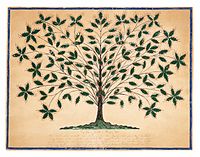Shaker furniture

 |
| Topics |
|---|
| Notable people |
|
Founders
Other members |
Shaker furniture is a distinctive style of furniture developed by the United Society of Believers in Christ's Second Appearing, commonly known as Shakers, a religious sect that had guiding principles of simplicity, utility and honesty. Their beliefs were reflected in the well-made furniture of minimalist designs.
History
Shaker communities were largely self-sufficient: in their attempt to separate themselves from the outside world and to create a heaven-on-earth, members grew their own food, constructed their own buildings, and manufactured their own tools and household furnishings.
—Metropolitan Museum of Art
Overview
Furniture was made thoughtfully, with functional form and proportion. Rather than using ornamentation—such as inlays, carvings, metal pulls, or veneers—which was seen as prideful or deceitful, they developed "creative solutions such as asymmetrical drawer arrangements and multipurpose forms to add visual interest." Furniture was made of cherry, maple or pine lumber, which was generally stained or painted with one of the colors which were dictated by the sect, typically blue, red, yellow or green. Drawer pulls for dressers or other furniture were made of wood.
A core business for the New Lebanon Shaker community by the 1860s was the production of well-made "ladder" back or turned post chairs. The minimalist design and woven seats were fast and easy to produce. Furniture built and used by the New Lebanon "believers" is exhibited in the Shaker Retiring Room at the Metropolitan Museum of Art in New York City, which originated from the North Family Shakers' 1818 First Dwelling House. The furniture, acquired in the 1970s, and Shaker textiles are considered among the finest Shaker collections in the world.
Many examples of Shaker furniture survive and are preserved today, including such popular forms as Shaker tables, chairs, rocking chairs (made in several sizes), and cabinets, which are said to have Shaker doors, known for being flat paneled with rail frames. Collections of Shaker furniture are maintained by many art and historical museums in the United States and the United Kingdom, as well as in numerous private collections including the Shaker tilting chair. The underlying principles of Shaker design have given inspiration to some of the finest designers of modern furniture. Shaker ladder back chairs, for instance, deeply influenced the work of an entire generation of postwar Danish designers. Also many ideals of furniture formed around the common Shaker furniture construction.
Notable people
- Tabitha Babbitt, Shaker toolmaker and inventor
- Ken Hakuta, Shaker furniture collector
- John Kassay, author and expert on Shaker furniture
- Isaac N. Youngs, Shaker furniture and clock maker
Gallery
A restored rocker at Shaker Village located near Harrodsburg, KY.
Shaker clock
Shaker dining table
Shaker bedroom
Shaker chairs at Hancock Shaker Village, Western Massachusetts, USA
Shaker bureau
Shaker student desk
See also
Further reading
- Andrews, Edward Deming and Faith Andrews. Masterpieces of Shaker Furniture. Courier Dover Publications; June 1999. ISBN 978-0-486-40724-1.
- Andrews, Edward Deming and Faith Andrews. Shaker Furniture: The Craftsmanship of an American Communal Sect Dover Publications. 1964.
- Becksvoort, Christian. The Shaker Legacy: Perspectives on an Enduring Furniture Style. Taunton Press; 2000. ISBN 978-1-56158-357-7.
- Grant, Jerry V. & Douglas R. Allen. Shaker Furniture Makers. Pittsfield, Mass.: Hancock Shaker Village, 1989.
- Grant, Jerry ; Stocks, David & Conran, Sir Terrence. Shaker: Function, Purity, Perfection. Assouline Publishing. New York, 2015.
- Kassay, John. The Book of Shaker Furniture. Univ of Massachusetts Press; 1980. ISBN 0-87023-275-4.
- McKinstry, E. Richard. The Edward Deming Andrews Memorial Shaker Collection. New York & London: Garland Publishing, 1987.
- Moore, William D., “‘You’d Swear They Were Modern’: Ruth Reeves, the Index of American Design, and the Canonization of Shaker Material Culture,” Winterthur Portfolio, 47 (Spring 2013), 1–34.
- Paterwic, Stephen J.. Historical Dictionary of the Shakers. Scarecrow Press; 11 August 2008. ISBN 978-0-8108-6255-5.
- Rieman, Timothy D. & Buck, Susan L. The Art of Craftsmanship : The Mount Lebanon Collection,Art Services International, and Chrysler Museum (Paperback—Feb 1995).
- Rieman, Timothy D. & Muller, Charles R. The Shaker Chair; Line Drawings by Stephen Metzger, (The Canal Press, 1984) This is the definitive work .







